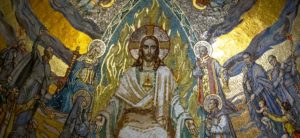INTRODUCTION
Abba St. Moses, called “the Robber,” or “the Black,” or “the Strong,” was one of the great Egyptian Desert Fathers of the late 4th century. He was likely originally from Nubia, or perhaps present-day Sudan. In any case, he was a released slave who lived as a robber in Nitria. Later in life he became a monk and was trained by Abba Isidore the Priest -another of the great Desert Fathers. He was ordained priest and became one of the great fathers of the monastic communities of Scetis. On the advice of St. Macarius he retired to Petra; he was martyred with seven others by barbarian invaders. He is a great example of Christian repentance, humility, and one who attained union with Christ.
***
The Gates of Heaven
+ Abba Poemen said: Abba Moses asked Abba Zechariah a question when he was about to die, saying, “Fr. is it good that we should hold our peace?” And Zechariah said to him, “Yes, my son, hold your peace.” And at the time of his death, while Abba Isodore was sitting with him, Abba Moses looked up to heaven and said, “Rejoice and be glad, O my son Zechariah, for the gates of heaven have been opened.”
Solitude and the Monastic Life
+ Abba Moses used to say, “The man who flees from the world is like ripe grapes; but he who dwells among the attractions of the children of men is like sour grapes.”
+ A certain brother went to Abba Moses in Scete and asked him to speak a word. The elder said to him, “Go and sit in your cell, and your cell will teach you everything.”
+ They used to that Abba Nastir was like the serpent which Moses made to heal of the people (Numbers 21:9); that he was perfect in all spiritual excellences; and that although he kept silence, he healed every man.. Abba Moses besought Abba Zechariah, saying “Speak a word of consolation to the brothers.” And Zechariah took his cloak and placed it under his feet, saying, “Unless a man dies like this, he cannot be a monk.”
+ Abba Poemen said, “A brother asked Abba Moses, ‘How is a man supposed to keep himself from his neighbor?’ The elder said to him, ‘Unless a man keeps in his heart that he has been three years in the grave, he will not be strong enough to keep this saying.”
+ “It is good for a man to die to every work which is evil, and he should not trouble a man before his departure from the body.”
+ “If a man does not put himself in the attitude of a sinner, his prayer will not be heard before God.” A brother said to him, “What is a sinful soul?” And the elder said, “Every one who bears his own sins, and does not consider those of his companion.”
Humility, Patience, and Long-Suffering
+ Once, the Fathers of Scete were gathered together. But because some people wanted to see Abba Moses, they treated him rudely saying, “Why does this Ethiopian come and go in our midst?” But Moses, hearing this, held his peace. When the congregation was dismissed, they said to him, “Abba Moses, were you not upset?” And he said to them, “Although I was upset, I did not utter a word.”
+ They used to say when Abba Moses was one of the clergy he wore a long outer garment and that the Bishop said to him, “Behold you are all white, O Abba Moses.” The elder said to him, “Is the abba within or without?” And again, wishing to test him, the Bishop said to the clergy, “When Abba Moses goes into the sanctuary drive him out, follow him, and hear what he says.” So when he went into the sanctuary, they rebuked him and drove him out saying, “Go outside, O Ethiopian!” After he left, he said to himself, “They treated you rightly, O you whose skin is dark and black. You shall not go back as if you were a white man.”
+ Abba Eupraxius used to say, “Humility is the tree of life which rises in the heights.” He also said, “Make yourself like the publican and don’t be guilty with the Pharisee. Choose the meekness of Moses so your heart, which is as hard as steel, may change into a fountain of water.”
His Hospitality and Love
+ Once a command was given to the brothers who were in Scete, saying, “Fast this week and celebrate the Passover.” So some of the brothers came from Egypt to Abba Moses. While he was boiling a little food for them, his neighbors saw the smoke of his fire rising up and they said to the clergy, “Behold, Moses has broken the command and has boiled some food in his cell.” So they said to them, “Hold your peace, when he comes to us we will speak to him.” Now when the Sabbath arrived, the clergy, having regard to his great ascetic labors, said to him before the whole assembly, “O Moses, though you broke the command of me, you established that of God.”
+ There was a certain brother who came to Scete to see Abba Arsenius, entered the church and entreated the clergy to take him to see him. The clergy said to him, “Refresh yourself a little and you will see him.” The brother said to them, “I will eat nothing until I meet and see him.” When the clergy heard this they sent a brother with him to show him Abba Arsenius, because his cell was some distance away. And when they had arrived there, they knocked at the door and went inside. After greeting him and praying, they sat down and held their peace. The brother who was from the church answered and said, “I will leave, pray for me.” But when the other brother saw that he did not speak with the elder, he said to the brother from the church, “I also will go with you,” and they departed together.
Then he entreated him, saying, “Take me also to Abba Moses who was a thief.” When they went to him, the elder received them with joy, and having refreshed them greatly he dismissed them in peace. The brother who had brought the visitor to Abba Moses said to him, “Behold, I brought you to a man from a foreign land and to an Egyptian, which of the two pleases you? And he answered and said to him, “The man who just received me and refreshed me.” When one of the elders heard what had happened, he prayed to God and said, “O Lord, explain this thing to me, for one flees from the world for Your Name’s sake and the other welcomes and kindly receives others for Your Name’s sake.” Behold, suddenly there appeared to him on the river two great boats: Abba Arsenius and the Spirit of God were traveling in silence in the one; and Abba Moses and the angels of God, feeding the monk with honey from the comb, were in the other.
Struggle with the Demons
+ On one occasion Abba Moses of Patara was engaged in a war against fornication, and he could not endure being in his cell, and he went and informed Abba Isidore of it; and the elder entreated him to return to his cell, but he would not agree to this. And having said, “Fr., I cannot bear it,” the elder took him up to the roof of his cell, and said unto him, “Look to the west,” and when he looked he saw multitudes of devils with troubled and terrified aspects, and they showed themselves in the forms of phantoms which were in fighting attitudes. Abba Isidore said unto him, ”Look to the east,” and when he looked he saw innumerable holy angels standing there, and they were in a state of great glory. Then Abba Isidore said unto him, “Behold, those who are in the west are those who are fighting with the holy ones, and those whom you have seen in the east are they who are sent by God to the help of the saints, for those who are with us are many.” And having seen this Abba Moses took courage and returned to his cell without fear.
Judge not…
+ A certain brother committed an offence in Scete, the camp of the monks, and when a congregation was assembled on this matter, they sent after Abba Moses, but he refused to come; then they sent the priest of the church to him, saying, “Come, for all the people are expecting you,” and he rose up and came. He took a basket with a hole in it and filled it with sand, and carried it upon his shoulders, and those who went out to meet him said unto him, “What does this mean, O father?” And he said to them, “The sands are my sins which are running down behind me and I cannot see them, and, even, have come to this day to judge shortcomings which are not mine.” And when they heard this they set free that brother and said nothing further to him.
+ These are the words, which Abba Moses said to Abba Poemen, and the first word, which was spoken by the elder, was: “It is better for a man to put himself to death rather than his neighbor, and he should not condemn him in anything.”
His Martyrdom
+ On one occasion when the brethren were sitting with Abba Moses, he said to them, “Behold, this day has the barbarians come to Scete; rise up and flee.” And they said to him, “Will you not flee, father? He said to them, “I have been expecting this day to come for many years past, so that might be fulfilled the command of our Redeemer, ”Those who take by the sword shall perish by the sword’” (St. Matthew xxvi, 52). And they said to him, “We then will not flee, but will die with you.” He said to them, “This is not my affair, but your own desire; let every man look after himself in the place where he dwells.” Now the brethren were seven in number. And after a little he said to them, “Behold, the barbarians have drawn near the door”; and the barbarians entered and slew them. Now one of them had been afraid, and he fled behind the palm leaves, and he saw seven crowns come down and place themselves on the heads of those who had been slain.




